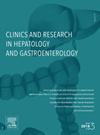Circulating tumor DNA in peripheral blood may predict the efficacy of immune-targeted therapy in patients with hepatocellular carcinoma
IF 2.4
4区 医学
Q2 GASTROENTEROLOGY & HEPATOLOGY
Clinics and research in hepatology and gastroenterology
Pub Date : 2025-06-06
DOI:10.1016/j.clinre.2025.102632
引用次数: 0
Abstract
Background & Aims
Hepatocellular carcinoma (HCC) is a highly prevalent and fatal malignancy globally. Accurate prognosis prediction is crucial for developing personalized therapeutic strategies.
Methods
This study involved 28 HCC patients who received immune-targeted therapy at the Xiamen Branch of Zhongshan Hospital of Fudan University from April 2020 to June 2022. Next-generation sequencing (NGS) of circulating tumor DNA (ctDNA) was conducted at baseline and after two treatment cycles. The primary objective was to investigate the relationship between changes in variation allele frequency (VAF) during therapy and clinical outcomes.
Results
A total of 134 single nucleotide variants, 1 insertion-deletion mutation, and 5 copy number variations were detected across the cohort. A decrease in mean VAF (VAFmean) after two cycles of immune-targeted therapy was associated with longer progression-free survival. The sensitivity and specificity of VAFmean reduction in predicting partial response(PR) and complete response(CR) were 1.0 and 0.8125, respectively, which were higher than those of serum alpha-fetoprotein (AFP) levels (0.9167 and 0.4667). No significant correlation was observed between baseline mutation status and the efficacy of immune-targeted therapy.
Conclusions
This study highlights that advanced ctDNA analysis can detect somatic mutations in a substantial proportion of patients with advanced HCC. Monitoring ctDNA dynamics during immune-targeted therapy enables real-time assessment of disease status and provides a basis for optimizing treatment strategies.
外周血循环肿瘤DNA可预测肝细胞癌患者免疫靶向治疗的疗效。
背景与目的:肝细胞癌(HCC)是一种全球范围内高度流行和致命的恶性肿瘤。准确的预后预测对于制定个性化的治疗策略至关重要。方法:本研究纳入2020年4月至2022年6月在复旦大学中山医院厦门分院接受免疫靶向治疗的28例HCC患者。在基线和两个治疗周期后进行循环肿瘤DNA (ctDNA)的下一代测序(NGS)。主要目的是研究治疗期间变异等位基因频率(VAF)变化与临床结果之间的关系。结果:在整个队列中共检测到134个单核苷酸变异,1个插入-删除突变和5个拷贝数变异。在两个周期的免疫靶向治疗后,平均VAF (VAFmean)的降低与更长的无进展生存期相关。VAFmean降低预测部分缓解(PR)和完全缓解(CR)的敏感性和特异性分别为1.0和0.8125,高于血清甲胎蛋白(AFP)水平的敏感性和特异性(0.9167和0.4667)。基线突变状态与免疫靶向治疗的疗效之间没有明显的相关性。结论:本研究强调,先进的ctDNA分析可以检测出相当比例的晚期HCC患者的体细胞突变。在免疫靶向治疗期间监测ctDNA动态可以实时评估疾病状态,并为优化治疗策略提供基础。
本文章由计算机程序翻译,如有差异,请以英文原文为准。
求助全文
约1分钟内获得全文
求助全文
来源期刊

Clinics and research in hepatology and gastroenterology
GASTROENTEROLOGY & HEPATOLOGY-
CiteScore
4.30
自引率
3.70%
发文量
198
审稿时长
42 days
期刊介绍:
Clinics and Research in Hepatology and Gastroenterology publishes high-quality original research papers in the field of hepatology and gastroenterology. The editors put the accent on rapid communication of new research and clinical developments and so called "hot topic" issues. Following a clear Editorial line, besides original articles and case reports, each issue features editorials, commentaries and reviews. The journal encourages research and discussion between all those involved in the specialty on an international level. All articles are peer reviewed by international experts, the articles in press are online and indexed in the international databases (Current Contents, Pubmed, Scopus, Science Direct).
Clinics and Research in Hepatology and Gastroenterology is a subscription journal (with optional open access), which allows you to publish your research without any cost to you (unless you proactively chose the open access option). Your article will be available to all researchers around the globe whose institution has a subscription to the journal.
 求助内容:
求助内容: 应助结果提醒方式:
应助结果提醒方式:


